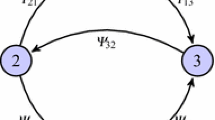Abstract
Belief learning in social networks is thought to occur through an update process that aggregates dispersed information on the beliefs of connected neighbors through social influences. We explore mechanisms to apply persuasive biases to beliefs at the individual and group level, using the popular DeGroot update as the basic network-learning scheme, to achieve purposeful control on belief learning. We show that linear control of belief learning results in the possibility of shaping the beliefs of individual agents. We prove convergence of the control and show that external persuasive biases, which are our linear control parameters, are not only learnt by the agents just as they learn beliefs, but they can even swamp out the original beliefs. We establish the theoretical foundation for linear dynamic control of belief learning in this paper and illustrate the key results with examples of small networks which show how emerging consensus can be amplified or even destroyed.










Similar content being viewed by others
References
Acemoglu D, Munther D, Lobel I, Ozdaglar A (2008) Bayesian learning in social networks. Mimeo, MIT
Acemoglu D, Ozdaglar A, ParandehGheibi A (2009) Spread of misinformation in social networks, LIDS Report 2812
Anagnostopoulos A, Kumar R, Mahdian M (2008) Influence and correlation in social networks. In Proceedings of the 14th ACM international conference on knowledge discovery and data mining (KDD’08)
Bala V, Goyal S (1998) Learning from neighbors. Rev Econ Stud 65(3):595–621
Berger R (1981) A necessary and sufficient condition for reaching a consensus using De-Groot’s method. J Am Stat Assoc 76(374):415–418
Bikhchandani S, Hirshleifer D, Welch I (1992) A theory of fads, fashion, custom, and cultural change as informational cascades. J Political Econ 100(51):992–1026
DeGroot MH (1974) Reaching a consensus. J Am Stat Assoc 69(345):118–121
DeMarzo M, Vayanos D, Zwiebel J (2003) Persuasion bias, social influence, and uni-dimensional opinions. Quart J Econ 118:909–968
Eugene S (1981) Non-negative matrices and Markov chains. Springer, Berlin
Friedkin NE (1998) A structural theory of social influence. Cambridge University Press, New York
Friedkin NE, Cook KS (1990) Peer group influence. Sociol Methodol Res 19:122–143
Friedkin NE, Eugene C (1999) Social influence networks and opinion change. Adv Group Process 16:1–29
Friedkin N, Johnsen EC (1997) Social positions in influence networks. Soc Netw 19:209–222
Golub B, Jackson MO (2010) Naive Learning in Social Networks: Convergence, Influence and the Wisdom of Crowds. Am Econ J Microecon 2(1):112–149
Goyal S (2010) Learning in networks handbook of social economics
Guturu P (2011) Identification of leaders, lurkers, associates and spammers in a social network: context-dependent and context-independent approaches. Soc Netw Anal Min 1(3):241–254
Jackson MO (2008) Social and economic networks. Princeton University Press, Princeton
Li C, Qi L (2011) Social opinion mining for supporting buyers’ complex decision making: exploratory user study and algorithm comparison. Soc Netw Anal Min (Online First, 13th April, 2011)
Mandyam S, Sridhar U (2011) Endogenous control of DeGroot learning. In: Third international conference on social informatics (SocInfo-2011), Singapore, Oct 6–8, 2011
Medhi J (2010) Stochastic processes. New Age International Publishers, New Delhi
Scott J (2011) Social network analysis: developments, advances, and prospects. Soc Netw Anal Min 1(1):21–26
Sridhar U, Mandyam S (2011) Information sources driving social influences: a new model for belief learning in social networks. In: International Conference on Advances in Social Network Analysis and Mining (ASONAM-2011), Kaohsuing, Taiwan, July 25–27, 2011
Watts D (2007) Viral marketing for the real world. Harv Bus Rev 85:22–23
Author information
Authors and Affiliations
Corresponding author
Rights and permissions
About this article
Cite this article
Sridhar, U., Mandyam, S. Exogenous control of DeGroot belief learning. Soc. Netw. Anal. Min. 2, 239–248 (2012). https://doi.org/10.1007/s13278-011-0041-9
Received:
Revised:
Accepted:
Published:
Issue Date:
DOI: https://doi.org/10.1007/s13278-011-0041-9




